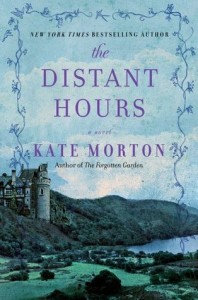THE DISTANT HOURS Book Review
By Lee Peoples | March 28th, 2012 | Category: Book Reviews, Fiction | 1 Comment » The Distant Hours by Kate Morton is historical fiction in true gothic style, replete with all of the elements of the genre: setting, plot, characters. The primary setting is Milderhurst Castle in Milderhurst Village, not far from London in England, between 1939 and 1992; a ruined castle complete with a moat that has been filled in, whispering walls, stormy nights; principal characters who are isolated from the rest of the outside world.
The Distant Hours by Kate Morton is historical fiction in true gothic style, replete with all of the elements of the genre: setting, plot, characters. The primary setting is Milderhurst Castle in Milderhurst Village, not far from London in England, between 1939 and 1992; a ruined castle complete with a moat that has been filled in, whispering walls, stormy nights; principal characters who are isolated from the rest of the outside world.
The narrative begins in 1992 in London, nearly a half century after the end of World War II. (Edie) Edith Burchill, an editor at Billings & Brown, watches her mother’s tearful reaction to a letter she receives. She learns later that it is a letter from Milderhurst Castle in Kent, but because her mother is reluctant to give her any more information, her curiosity leads her to seek answers on her own. When her job as editor takes her to Kent, she accidentally stumbles across Milderhurst and visits the now decaying castle. She has a feeling of déjà vu and realizes sometime later she has been here before.
The story is told from multiple points of view and numerous flashbacks with Edith Burchill at its center, as in her search to satisfy the curiosities she now has about her mother’s past, she reveals how “the distant hours” of the past inform the present.
The story essentially covers the time from 1939 to 1992, with allusions to earlier times, when Milderhurst Castle, now in deep decay, encompassed a thriving world.
In 1939, Edie’s mother, not yet thirteen, was evacuated to the English countryside, where it was expected that she and an older sister and brother along with other children would be safe from Hitler’s bombs. There she was taken in by a young woman not much older than she and brought to the castle. Juniper Blythe and her two older half-sisters, twins Saffy (Serephina) and Percy (Persephone), made her welcome. Their father, Raymond Blythe, a famous author, particularly noted for his novel, The True History of the Mud Man, a childhood favorite of Edie, maintained strict control over his daughters. The twins’ mother had died in a tragic accident when they were very young; and their father had remarried some years later to a young woman not much older than they. To this second marriage, Juniper was born; and when she was just a little girl, her mother died from complications of a second pregnancy . She was raised by Saffy and Percy.
Meredith Baker (Edie’s mother) and Juniper became close friends. In 1941, she reluctantly returned to her home in London. In spite of promises to keep in touch, contact was soon lost, and it was not until nearly fifty years later, when Meredith receives the letter that a mystery begins to unravel. Her mother’s tearful reaction and her secretiveness cause Edie to begin her search of the truth. Little does she know what she will discover, both of her mother’s past and that of the occupants of Milderhurst Castle. Having always been curious about the origin of Blythe’s Mud Man, the story of a couple of orphans who lose their parents in a ghastly house fire and who go to live with their uncle in a castle, Edie is all the more determined to follow through on her search of her mother’s past.
To entertain and occupy her father, who is recuperating from a heart attack, she reads The True History of the Mud Man to him. Answering his question of what is it about, she explains: “Duty and betrayal, absence and longing, the lengths to which people will go to protect the ones they cherish, madness, fidelity, honor, love. . . ” (214). Could this plot parallel the deep, dark secrets of Milderhurst Castle?
Through her research, Edie Burchill comes to know her mother and thus herself. The author facilitates the telling of the story using multiple first person narrators in conjunction with numerous flashbacks. Long-buried secrets begin to unravel themselves, and the entire story proves to be one of missed opportunities for all involved. Missed opportunities! Dashed hopes and dreams! Lives destroyed by a controlling family member. When she is forced to spend a night in the castle because of a raging storm, she has the same sense of an indescribable force at work within Milderhurst, as she has had on other occasions of her visits: “. . . a sort of beckoning, as if the castle itself were calling to me” (384).
I thoroughly enjoyed this modern gothic. The Distant Hours is so reminiscent of some of my favorite authors—the Bronte sisters, Charles Dickens, Nathaniel Hawthorne, Daphne DuMaurier, to name a few. Captivating and full of suspense and surprises, it kept me in thrall from beginning to end. I look forward to reading more of Kate Morton’s romances.









Excellent review, merci Lee.